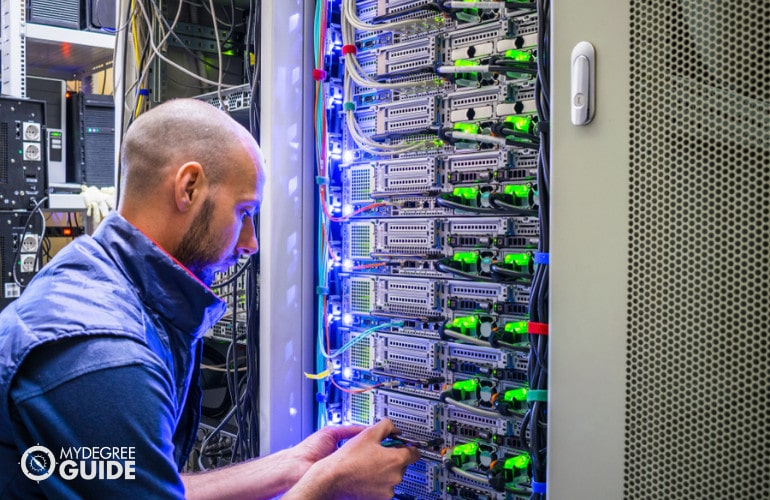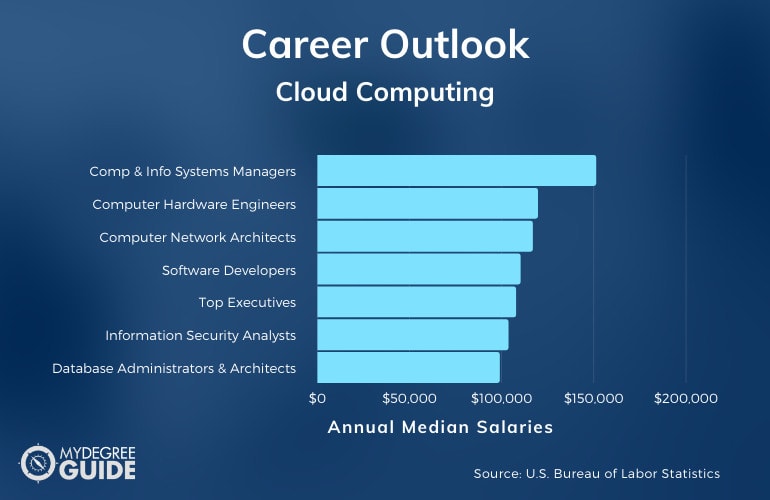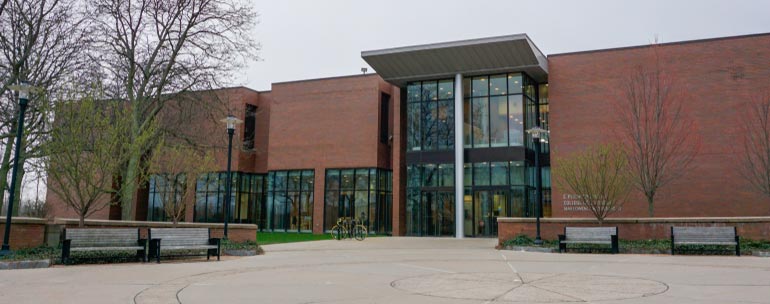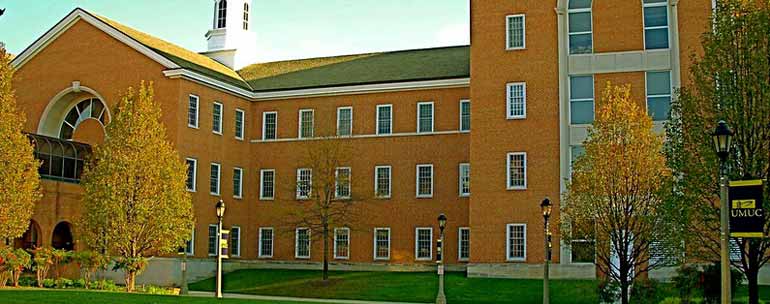If you enjoy working with computers and technology, you can advance your training and qualifications with a masters in cloud computing.

Nearly every industry and organization is moving to cloud computing. Technology continues to advance at lightning speeds, opening doors for better business management and service delivery. As a result, the demand for computer specialists continues to grow.
Editorial Listing ShortCode:
Computer specialists are needed to help these organizations transition from in-house data management and service delivery to cloud computing management. Specialists are also needed to maintain cloud networks and protect stored data.
Online Masters in Cloud Computing Programs

Many organizations and businesses have already moved to cloud computing. These organizations may keep their data stored in an online network rather than in-house. Some now offer services via the cloud rather than through direct customer contact.
You can see this in nearly every industry, from hospitals storing medical data online to entertainment services streaming videos. Someone must manage all these networks. A masters in cloud computing can help you advance your skill sets in this field.
Editorial Listing ShortCode:
Professionals can design and operate cloud computing platforms and help organizations transition to cloud computing systems. Cloud computing professionals often work as computer engineers, network architects, computer programmers, data analysts, network administrators, or systems managers.
Tasks of cloud computing professionals can include the following:
- Assess the cloud’s impact on service management and delivery
- Design effective cloud computing solutions
- Explain cloud computing to stakeholders
- Help organizations transition to cloud computing
- Implement cloud architecture
- Address security, compliance stipulations, and delivery automation of the cloud
Your coursework can give you a broad understanding of cloud technology and its relationship to business management and service delivery. This can include financial management, communications, procurement, and other business processes.
You will likely take classes in technology, data analytics, business management, computer programming, mathematics, and more. Some programs also require a hands-on capstone project in a real or simulated environment.
Cloud Computing Careers & Salaries

Cloud computing is used in nearly every industry across the nation. According to the Bureau of Labor Statistics, computer and information technology occupations are expected to experience 13% job growth over the next ten years.
| Careers | Annual Median Salaries |
| Computer and Information Systems Managers | $151,150 |
| Computer Hardware Engineers | $119,560 |
| Computer Network Architects | $116,780 |
| Software Developers, Quality Assurance Analysts, and Testers | $110,140 |
| Top Executives | $107,680 |
| Information Security Analysts | $103,590 |
| Database Administrators and Architects | $98,860 |
| Computer Systems Analysts | $93,730 |
| Computer Programmers | $89,190 |
| Network and Computer Systems Administrators | $84,810 |
Computer systems design and related services employ the majority of computer network architects, computer programmers, and data administrators. Education, telecommunication, and insurance and finance industries also employ many computing specialists.
MS in Cloud Computing Curriculum & Courses

Every program offers different classes and has different requirements, but here are examples of the types of classes you’re likely to find in a cloud computing masters program:
- Application Database Development: You’ll learn how to develop an application for web platforms by means of user requirements, user interface design, program design, programming logic, and testing processes.
- Cloud Computing Implementations and Migrations: This course teaches you how to implement and configure a cloud environment.
- Cloud Infrastructure Planning, Design, and Configurations: This course covers how to apply the underlying concepts, standards, and technologies of cloud computing to the planning, design, and configuration of a cloud infrastructure.
- Cloud Services and Technologies: This course covers the fundamental concepts of cloud computing, cloud services, and cloud applications.
- Decisive Thinking, Communicating, and Leading in Technology Fields: Some programs may require this course to prepare you for professional communication and leadership opportunities.
- Emerging Technologies: In this class, you’ll learn about the technologies that impact individuals, industry, technology, and society.
- Information Technology and System Trends: This course studies current information technology and trends.
- Network Engineering: You’ll have the opportunity to explore network engineering concepts, functions, applications, configurations, and hardware in this course.
- Project Management Foundations: In this course, you’ll learn about the fundamentals of project management.
- Security and Enterprise Networks: You’ll learn about the core security principles that apply throughout networked systems.
Some programs require a thesis or a capstone project to graduate. Also, some programs offer degree specializations, such as mobile services, data analytics, data-intensive computing, information management, and cloud infrastructures.
Should I Get a Master in Cloud Computing?

Cloud computing can be a rewarding career path for anyone with experience or interest in computers and technology. Even if you don’t want to spend your career in enterprise cloud computing, having this skill set and being able to manage digital technology can be an asset in today’s world.
Because we live in a highly digital society, cloud computing specialists are in high demand. More and more services are moving to automation, so employment of cloud computing specialists is expected to increase.
Editorial Listing ShortCode:
With increased demand often comes increased salaries. Cloud computer specialists make above average salaries, according to the Bureau of Labor Statistics. Cloud computer specialists often work online, and there are masters programs available online as well. The flexibility of learning and working online might appeal to your current or desired lifestyle.
Earning a masters in cloud computing can help you acquire advanced skills in this specialized area within the computer and IT field. A masters degree can also help you stand out in the competitive job market and potentially qualify for senior or leadership positions down the road.
How to Choose an Online Masters Degree in Cloud Computing Program

There are so many online masters programs in cloud computing you can choose from. How do you find the right program for you?
Here are just a few factors you may want to consider when searching for a program:
- Cost. Each school has different tuition rates per credit, and each program requires a different amount of credits to complete. Plus, you may be charged differently if you are a local student or an out-of-state student.
- Program specifics. Some programs require a capstone project or a thesis. Programs can also offer different specializations, and some provide hands-on training.
- Job placement rating. You can often find a school’s job placement rating on their website.
- Flexibility. Many cloud computing programs are entirely online. Even so, you may want to consider how long each term lasts and whether you can go at your own pace or must stay with your cohort.
- Recognition. You may want to look for schools that have been awarded the National Center of Academic Excellence in Cyber Defense Education (CAE-CDE) designation, which is sponsored by the NSA and the DHS.
- Accreditation. Your school’s accreditation status can impact your eligibility for financial aid and employment opportunities.
As you explore online master’s degrees in cloud computing, it can help to keep in mind the factors that are most important to you.
Admissions Requirements

Online cloud computing programs, much like other online network administration degree programs, have varying admissions requirements. You can visit the admissions page of your program or contact the admissions department to discover their specific requirements.
Here are some common requirements:
- Bachelor’s degree from accredited school
- Transcripts and GPA
- Application and fee
- GRE or GMAT scores (only some schools require them)
Some schools also require letters of recommendation from undergraduate professors or a personal essay explaining why you feel the program would be a match for your career goals.
Accreditation

Accreditation signifies a quality program. Schools voluntarily put themselves through the accreditation process. Receiving regional accreditation shows that the school meets the highest standards for instruction, curriculum, and even business operations.
Attending an accredited program can benefit you in many ways. It assures you’re receiving a quality education, and employers tend to prefer graduates with accredited degrees as well. Plus, federal and state governments only award financial aid to students from accredited universities.
Editorial Listing ShortCode:
To check your program’s accreditation status, you can visit the US Department of Education’s website.
Financial Aid and Scholarships

Financial aid is possible for graduate students who qualify. The federal and state governments award aid to students based on need. You can fill out the Free Application for Federal Student Aid (FAFSA) to see if you qualify.
You can also search for scholarships, fellowships, and other awards. You may want to start with your program department. Many departments offer scholarships and aid to students based on several qualifying factors.
Some employers also offer financial assistance to employees furthering their education. You can check with your supervisor or human resources to see if your company offers financial incentives to return to school. You can also check with community organizations and businesses. Many clubs and nonprofits also offer scholarships.
What Is a Cloud Computing Masters Degree?

A cloud computing masters degree is a program that teaches you how to deliver online computing services. You can learn how to manage servers, storage, databases, networking, and software.
Nearly everyone uses cloud services. If you send emails, stream videos, or store files online, you’re using cloud services. Cloud service technology is relatively new, but businesses are embracing it because it cuts the cost of service delivery and business management.
A masters in cloud networking can qualify you to implement, maintain, and secure this cutting edge technology.
What Will I Learn from a Master of Science in Cloud Computing Architecture?

A masters program in this field enables you to deepen your knowledge in cloud computing. Holding a masters degree can typically open more doors for employment, and it may even help you qualify for senior or leadership positions down the road.
An MS in Cloud Computing Architecture can help you develop your skills in analysis and design of cloud-based computer systems. This program focuses on cloud technologies, cloud applications, and the design of cloud platforms. You can expect to be trained in advanced computer, network, and cloud technologies.
Is Cloud Computing a Good Career?
Yes, cloud computing is a good career for many professionals. Cloud computing specialists can work in a variety of industries, such as business, finance, insurance, government, and education. Nearly every organization needs an in-house or contract specialist who understands cloud computing.
Common jobs in this field include computer programmer, network architect, systems administrator, and computer systems manager. According to the Bureau of Labor Statistics, computer and IT occupations make a median annual salary of $91,250. This field is also expected to experience 13% job growth over the next ten years.
Editorial Listing ShortCode:
Computer and information systems managers often earn the highest wages, with a median salary of $151,150 (Bureau of Labor Statistics). Of course, many factors, such as your work experience and geographical location, influence the type of job you can get and how much you make.
What Can You Do with a Masters in Cloud Computing Degree?

You may have the opportunity to work in a wide variety of fields with a cloud computing degree.
Common cloud computing jobs include:
- Network engineer
- Systems engineer
- Systems administrator
- Solutions architect
- Software engineer
A masters program in this specialty area can help you develop your computer programming skills and your ability to interpret large amounts of data.
These skills are highly versatile and valuable in nearly every industry. There are many factors that influence employment, but the demand for cloud computing professionals continues to grow as more and more organizations store information and services on the cloud.
How Long Does It Take to Get a Master’s in Cloud Computing Online?

How long it takes you to get a masters in cloud computing often depends on your program’s academic schedule and your ability to enroll part-time or full-time.
If it’s a 36 credit hour program with no thesis requirement, it can be completed in 1 year with full-time enrollment, including summer classes. A thesis requirement can add some additional time to completion, as will attending only part-time.
Some programs are more intensive, requiring more credit hours and a thesis or capstone project. With full-time study, these programs generally take 2 years to complete.
Is a Master’s Degree in Cloud Computing Worth It?
Yes, a master’s degree in cloud computing is worth it for many students. Cloud computing is a lucrative field, and the wages for computer and IT occupations are well above average.
Editorial Listing ShortCode:
The Bureau of Labor Statistics predicts that this field will continue to be in demand, with more jobs than people to fill them. Employment of database administrators and architects is expected to grow 8% over the next ten years. Meanwhile, computer and information systems managers are projected to experience 11% job growth (Bureau of Labor Statistics).
Universities Offering Online Masters in Cloud Computing Degree Programs
Methodology: The following school list is in alphabetical order. To be included, a college or university must be regionally accredited and offer degree programs online or in a hybrid format.

Arizona State University offers an online program for a Master of Science in Information Technology. It requires the completion of ten courses that are each 7.5 or 15 weeks long. The curriculum includes Principles of Computer and Information Technology Architecture, Advanced Information Systems Security, and Advanced Database Management Systems.
Arizona State University is accredited by the Higher Learning Commission of the North Central Association of Colleges and Schools.

Ball State University offers an online Master’s in Information and Communication Science program that can often be completed in as little as six terms.
The program emphasizes the real-life application of concepts and has a 90% job placement rate after graduation. Students in the program have the opportunity to learn from certified AWS Cloud Practitioners.
Ball State University is accredited by the Higher Learning Commission.

Capella University offers an online program for a Master of Science in Information Technology with a specialization in Enterprise Networks and Cloud Computing.
It includes seven core courses, five specialization courses, and an applied IT project. Students in the program get unlimited access to Skillsoft, an online resource for IT and business knowledge.
Capella University is accredited by the Higher Learning Commission.

Colorado Technical University offers a Master of Science in Information Technology with a specialization in Network Management.
The program covers various networking technologies, equipment, and software. It is available both online and on campus. Courses include Computer Systems Security Foundations, Enterprise Systems Architecture, and Enterprise Data Management.
Colorado Technical University is accredited by the Higher Learning Commission of the North Central Association of Colleges and Schools.

DeVry University offers a Master’s in Network and Communications Management. The program is designed for those with and without prior experience in the field. It covers project management, managerial skills, communications and networking, and technical skills. DeVry is accredited by the Accreditation Council for Business Schools and Programs.
DeVry University is accredited by The Higher Learning Commission.

George Washington University offers a Master’s in Cloud Computing Management program. It is 100% online and 30 credit hours long and usually takes about two years to complete.
Key areas covered in the program include cloud applications architecture, computer architecture and design, big data and cloud computing, intrusion detection, and cloud migration strategy.
George Washington University is accredited by the Middle States Commission on Higher Education.

North Carolina State University offers an online Master’s in Computer Networking program. This is a non-thesis option that can be utilized by students who are unable to attend classes on campus. It can help prepare students for employment in industrial research, development, and design environments.
North Carolina State University is accredited by the Southern Association of Colleges and Schools Commission on Colleges.

For students interested in system administrator degree programs, the Rochester Institute of Technology offers a Master of Science in Networking and Systems Administration. The program includes five core courses, four technical electives, and a thesis or capstone project. There are bridge courses available for students who do not already have a strong background in computer systems and networking.
Rochester Institute of Technology is accredited by the Middle States Commission on Higher Education.

Strayer University offers an online program for a Master of Science in Information Systems with a concentration in Enterprise Network Management.
The program includes twelve 11 week courses, including Enterprise Wireless Networks, Network Architecture Analysis, and Cloud and Virtual Computing. Advanced Systems Analysis and Design and Strategic Planning for Database Systems are also included in the curriculum.
Strayer University is accredited by the Middle States Commission on Higher Education.

The University of Maryland Global Campus offers a Master’s in Cloud Computing Architecture. All courses are available online, and select courses are also available in a hybrid format. Core courses cover cloud services and technology, network engineering, cloud infrastructure planning, and cloud computing implementations and migrations.
UMGC is accredited by the Middle States Commission on Higher Education.
Getting Your Cloud Computing Master’s Degree Online

The computer and IT field is predicted to continue being in high demand for the next decade. With everything going digital, organizations will likely continue to move from in-house management and service delivery to cloud computing services and data management.
Pursuing a masters in computer networking or cloud computing can help you enhance your expertise in this lucrative field. Enrolling in an online program from an accredited institution can enable you to earn a credible degree while maintaining your other work and life responsibilities.
If you desire to become an expert in cloud computing, you can start your journey by exploring online grad programs today!

